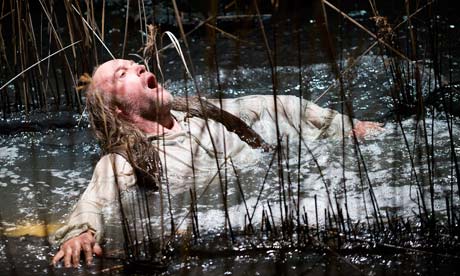
Wolfgang Rihm's one-acter was last seen in London in 1987 when the long-gone and much missed Almeida festival presented its British premiere. Completed in 1978, it remains the only one of Rihm's theatre works (nine to date, including a full-length ballet) to have been staged here, and while it's a pity that Rihm's 60th birthday this year hasn't encouraged a UK production of one of the more ambitious later scores, ENO's production of Lenz is a welcome revival of a taut and dramatically potent piece of music theatre.
Based upon Georg Büchner's novella, Rihm's opera depicts a 19-day episode in the life of the 18th-century poet Jakob Lenz, a friend of Goethe and member of the Sturm und Drang movement, who suffered from what would now be diagnosed as schizophrenia. It's a graphic musical portrait of a man's mental disintegration and a huge dramatic challenge for the baritone in the central role of Lenz.
A quarter of a century on the score's expressionism seems much more indebted stylistically to Peter Maxwell Davies's Eight Songs for a Mad King than it did when it was new, though Rihm does use a larger instrumental ensemble, and includes two other solo roles and a chorus of six.
Yet the work's concentration and theatrical spareness, the crucial sense of less meaning more dramatically, simply doesn't come over in Sam Brown's over-elaborate staging. It was a good choice for ENO to present in a smaller space, and in the Hampstead Theatre it would have been possible to generate the sense of immediacy and oppressiveness on which the opera depends, while vocally and dramatically Andrew Shore's performance as Lenz is an extraordinary tour de force by any standards.
But Brown loses most of the power that Shore generates by surrounding him with too much detail, blurring the outlines of the musical framework by running scenes into one another, introducing an extra character – the woman with whom Lenz was obsessed, Friederike Brion – and bringing the chorus on stage at every opportunity. The costumes are strictly in period, while Annemarie Woods's set is a slice of meticulously depicted naturalism with a muddy, reed-fringed pond through which the whole cast is encouraged to splash as often as possible, and into which Shore disappears altogether on a couple of occasions.
On its own stagey terms, it's all deftly done, and both Jonathan Best as the pastor Oberlin and Richard Roberts as Lenz's foppish friend Kaufmann provide Shore with fine support, just as conductor Alex Ingram extracts all the pungency from Rihm's score. But what should be a genuinely upsetting portrait of a sensitive man on the road to destruction seems too much like a curious historical pageant, uninvolving and rather slight.

